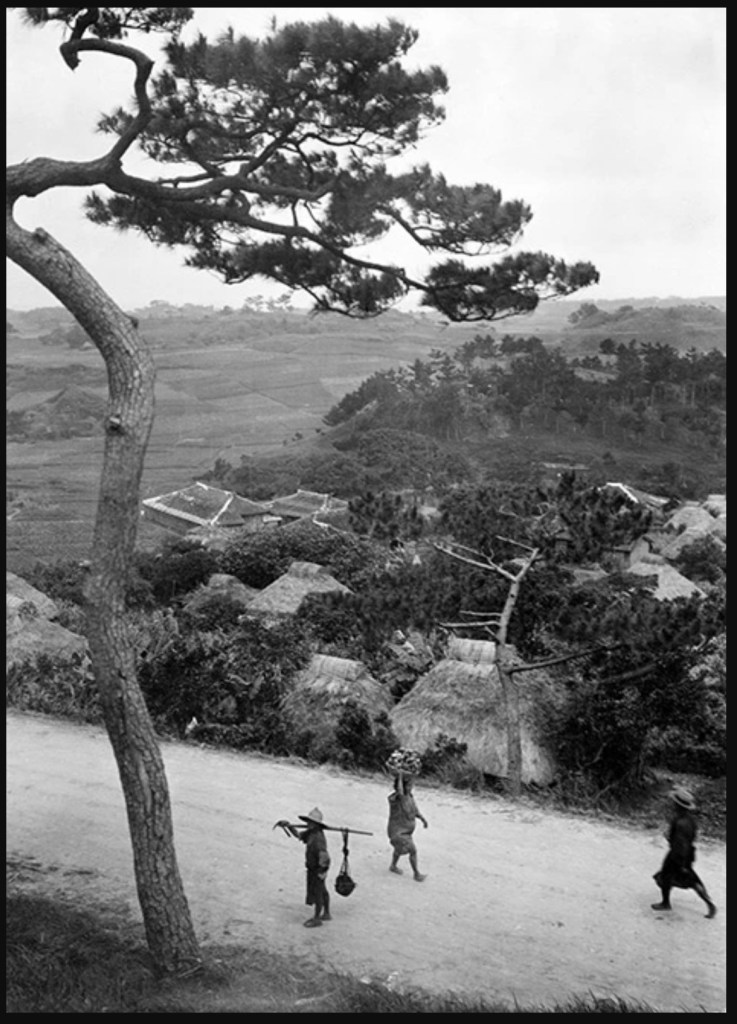The following list of Okinawan proverbs were found here.
Ataishi turu atairu. – We get along well with those we can get along with well.
Achinee ya tankaa mankaa. – Business is a two-way street.
Aramun jooguu ya duu ganjuu. – One who eats plain food is healthy.

Ichariba choodee. – Once we meet and talk, we are brothers and sisters.
Uya yushi kwa yushi. – Parents and children teach one another.
Kaagee kaa ru ya ru. – Beauty is skin deep.
Kamuru ussaa mii nayun. – The more you eat, the more you gain.
Kuu sa kana sa. – Small things are lovable.
Kuchi ganga naa ya yakutatan. – A smooth talker is a good-for-nothing person.
Kutubaa. Jin chikee. – Spend words as efficiently as money.
Kutuba noo ushikumaran. – A word can’t be recalled once spoken.

Shikinoo chui shiihii shiru kurasuru. – Let’s live helping each other in this world.
Shinjichi nu ada nayumi. – Kindness will never be wasted in any way.
Jin too waraaran kwa tu ru waraariiru. – We can laugh happily with our children, but not with money.
Chu uyamee ru duu uyamee. – If you respect others, they will respect you.
Choo kukuru ru dee ichi. – The heart is the most essential human quality.

Tusui ya tatashina mun. Warabee shikashina mun. – The old should be treated with due respect. Children should be treated with gentleness.
Tusui ya takara. – The old people are treasures to us.
Miitundaa duu tichi. – Man and wife are one flesh.
Nuchi nu sadamee wakaran. – Only God knows one’s term of life.

Machushi garu ufu iyoo tuyuru. – One who waits patiently will catch a big fish.
Miinai chichi nai. – We learn by watching and listening.
Mii ya tin niru aru. – Our fates are as registered by heaven.
Munoo yuu iyuru mun. – Speak well of others.
Yaasa ru maasaru. – Food is delicious when one is hungry.

Duu nu duu ya duu shiru shiyuru. – You know your body best.
Choo kani ru deeichi. – Common sense is essential.
Yii kutoo isugi. – Do good things quickly.

Chira kaagi yaka chimu gukuru. – Kind hearts are better than fair faces.
Yuu ya shititin mii ya shitinna. – Even if you hide yourself from the world, don’t lose sight of your real nature.
Nmarijima nu kutuba wasshii nee kuni n wasshiin. – Forgetting your native tongue means forgetting your native country.
Ashibi nu chura saa ninju nu sunawai. – The more the merrier.
Acha nu neen chi ami. – Tomorrow is a new day.
Yikiga nu kutubaa shuumun gaai. – A man’s word is his honor.
Mookiraa kwee michi shiri. – Once you have made a fortune, know how to spend it.





I really have a deep respect for Uchinaguchi and Uchina in general. Thank you for the post. You may remember me from a few years back. We mentioned a common musician from Okinawa by the name of Uema Ayano, and the Sake Mart in Chatan.
Hi, Kim. How have you been? Have you had a chance to revisit Chatan since your post “Kim Pennebaker on Uema Ayano”? I hope all is well. Take care. -Jim